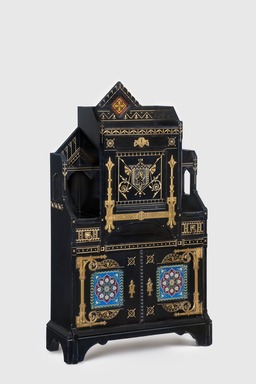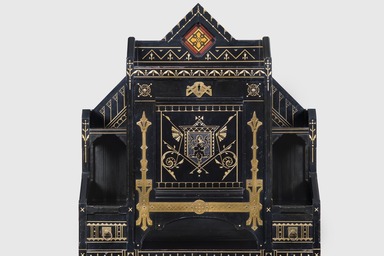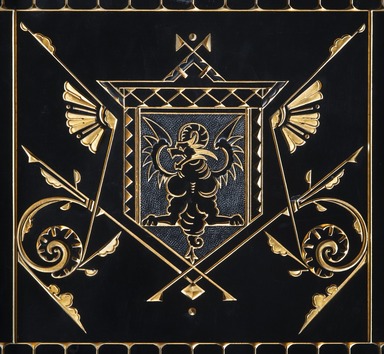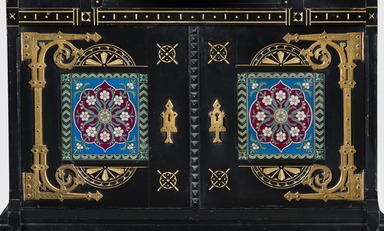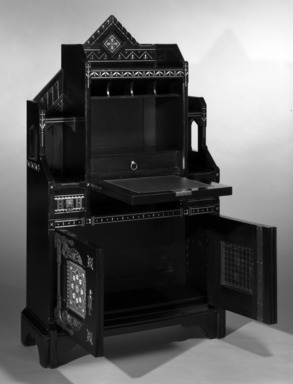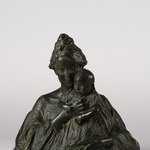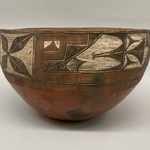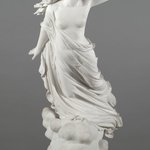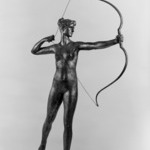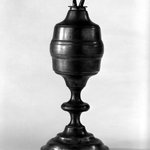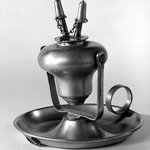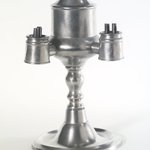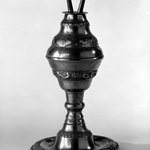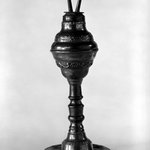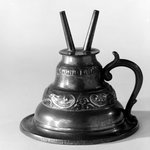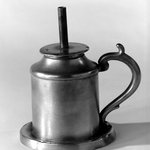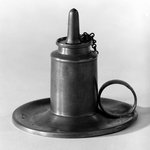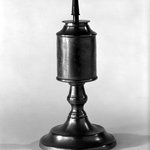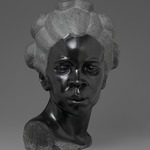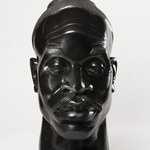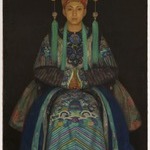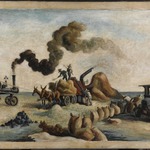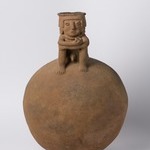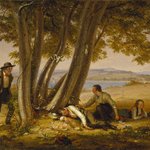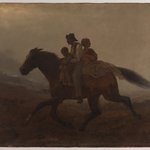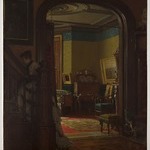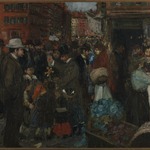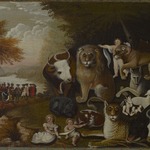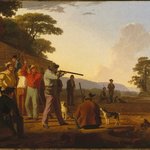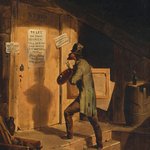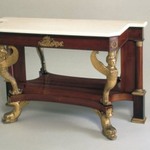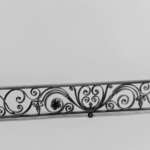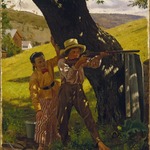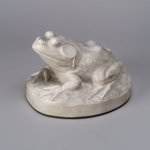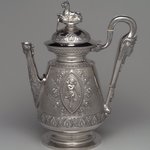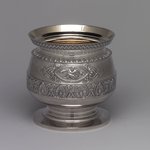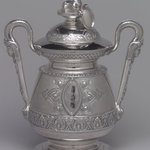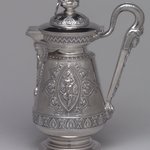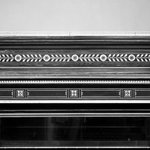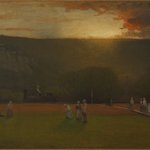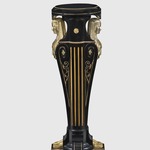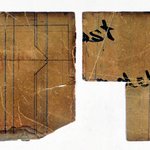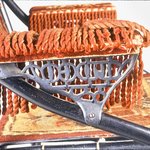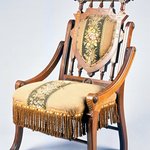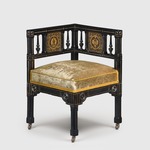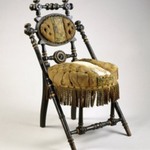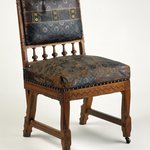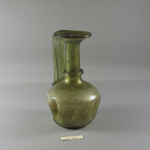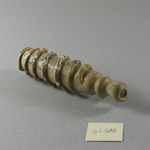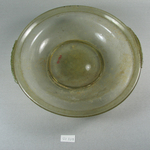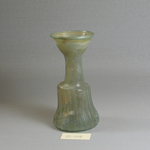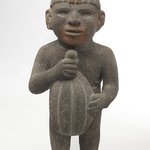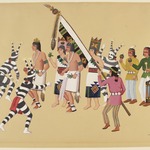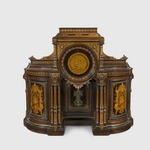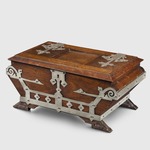Cabinet-Secretary
Decorative Arts and Design
This cabinet-secretary is one of Kimbel and Cabus’s most developed works in the Modern Gothic style. While it is a functional object, the striking form—blackened to resemble ebony, with bold surface ornamentation and shelves for art objects—suggests that it was intended for display as much as for use. Elaborate cast metal hinges and decorative escutcheons take even the most practical elements to expressive heights, animating the drop-front desk and cabinet doors, which display colorful French-made tiles of Islamic inspiration.
MEDIUM
Painted cherry, copper, brass, gilding, leather, earthenware
DATES
ca. 1875
DIMENSIONS
60 × 35 × 14 in. (152.4 × 88.9 × 35.6 cm)
(show scale)
MARKINGS
reverse of each ceramic tile, molded lettering: "MONTREAU / L. M&.Cie / CREIL"
SIGNATURE
no signature
INSCRIPTIONS
no inscriptions
ACCESSION NUMBER
1991.126
CREDIT LINE
Bequest of DeLancey Thorn Grant in memory of her mother, Louise Floyd-Jones Thorn, by exchange
CATALOGUE DESCRIPTION
Cabinet or secretary; ebonized wood, brass, leather, ceramic tile. Cabinet of plank construction; rectangular block front bottom topped by square fall-front section, which intersects a peaked, pyramidal back support. Deep, narrow side shelves with pierced outer sides over small square side drawers (g, h) flank the central fall-front section. Cabinet (a) rises on blocked feet with curved side support and scalloped base. Bottom front has two doors inset with elaborate, incised, gilt metal, functional hinge plates and escutcheons; all fittings held in place by round-head screws. Center of lower doors inset with ceramic tiles capped at top and bottom with gilt, incised fan motifs. Tile decoration: red, pierced quatrefoil design with white-pedaled, green-stemmed flowers radiating from center rosette, all on a blue ground; side border design of opposing green and black chevrons and green semi-circles on top and bottom, with diamond-shaped motifs in corners. Right edge of proper left door panel contains vertical band of carved, pyramidal decoration. Interior lower cabinet has one adjustable shelf (b) with four holding pegs (c, d, e, f). Lower section of cabinet separated from upper section by a narrow, horizontal, gilt-incised band of alternating vertical slash-and-dot pattern. Upper section of cabinet has fall-front panel with arched and scalloped bottom edge and large gilt, incised, decorative hinge plate and escutcheon. Center panel decorated with winged dragon on a stippled ground in square canopy surrounded by conventionalized gilt-incised floral design. Upper section of cabinet topped by blind gallery, accented by small diamond-shaped marquetry panel. Marquetry decoration: outlined center rosette with four larger solid black radiating triangular petals, all on a yellow diamond-shaped ground with a dark red border outlined in black with solid black diamond-shaped motifs in each corner. Triangular back support of cabinet extends from midway up the fall-front to a peak directly above the marquetry panel. Interior fall-front contains green stippled leather writing surface with gilt on red Greek-key border; single interior drawer (i) and open storage area topped by four deep, narrow storage spaces separated by three dividers. Cabinet retains one original key for lower cabinet doors (j) and later smaller key for upper fall-front door (k). (Sub letters are for description references only)
CONDITION - Overall very good. Ebonized finish appears to be intact; gilding along edges of metalwork shows minor wear, ceramic tiles in excellent condition.
MUSEUM LOCATION
This item is not on view
CAPTION
Kimbel and Cabus (1863–1882). Cabinet-Secretary, ca. 1875. Painted cherry, copper, brass, gilding, leather, earthenware, 60 × 35 × 14 in. (152.4 × 88.9 × 35.6 cm). Brooklyn Museum, Bequest of DeLancey Thorn Grant in memory of her mother, Louise Floyd-Jones Thorn, by exchange, 1991.126. Creative Commons-BY (Photo: Gavin Ashworth, 1991.126_GavinAshworth.jpg)
IMAGE
overall, 1991.126_GavinAshworth.jpg. Gavin Ashworth, 2020
"CUR" at the beginning of an image file name means that the image was created by a curatorial staff member. These study images may be digital point-and-shoot photographs, when we don\'t yet have high-quality studio photography, or they may be scans of older negatives, slides, or photographic prints, providing historical documentation of the object.
RIGHTS STATEMENT
Creative Commons-BY
You may download and use Brooklyn Museum images of this three-dimensional work in accordance with a
Creative Commons license. Fair use, as understood under the United States Copyright Act, may also apply.
Please include caption information from this page and credit the Brooklyn Museum. If you need a high resolution file, please fill out our online
application form (charges apply).
For further information about copyright, we recommend resources at the
United States Library of Congress,
Cornell University,
Copyright and Cultural Institutions: Guidelines for U.S. Libraries, Archives, and Museums, and
Copyright Watch.
For more information about the Museum's rights project, including how rights types are assigned, please see our
blog posts on copyright.
If you have any information regarding this work and rights to it, please contact
copyright@brooklynmuseum.org.
RECORD COMPLETENESS
Not every record you will find here is complete. More information is available for some works than for others, and some entries have been updated more recently. Records are frequently reviewed and revised, and
we welcome any additional information you might have.
Is this demon crest related to a secret society or satanism?
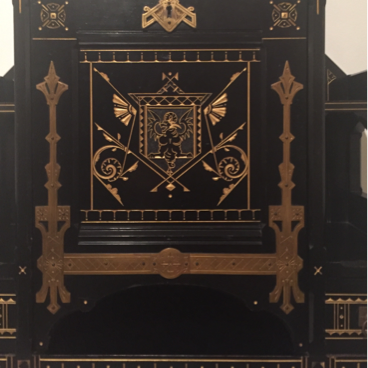
Interesting question! This cabinet was made in the Modern Gothic style by Kimbel and Cabus, which means pointed arches and gilded decorations. I'm looking into this particular aspect of the iconography right now! It's described simply as a winged dragon in our records.
It may be influenced by heraldic patterns and coats of arms, which the builders would have seen a time or two. They certainly put a lot of images and styles into this particular work, including staining the wood to make it look like dark ebony!
Tell me more.
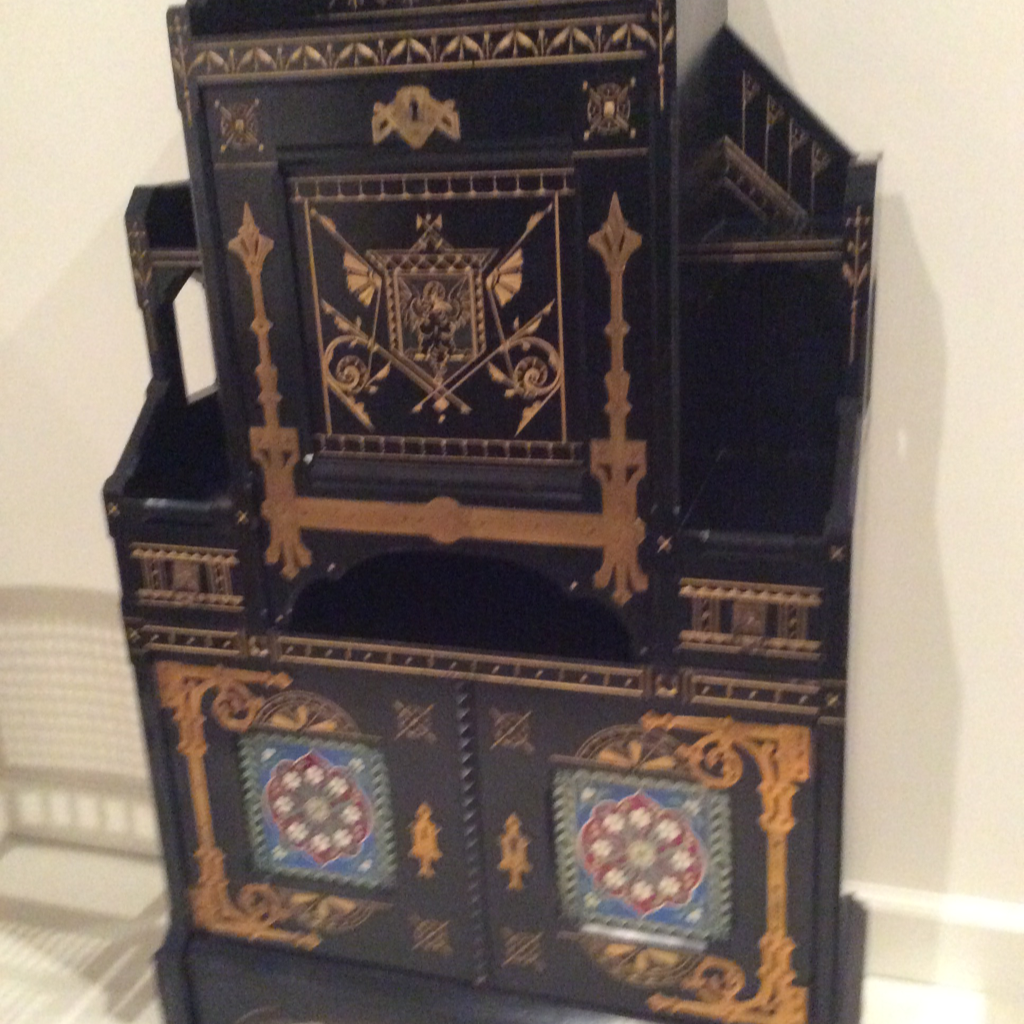
This is a terrific example of the Gothic Revival style in America. One detail of this piece is the use of long "strap hinges". Although these were functional, they were also highly decorative. This emphasis on functionality was a key feature of the Gothic style. The use of ebonized wood and carved chevrons are also hallmarks of this style.
